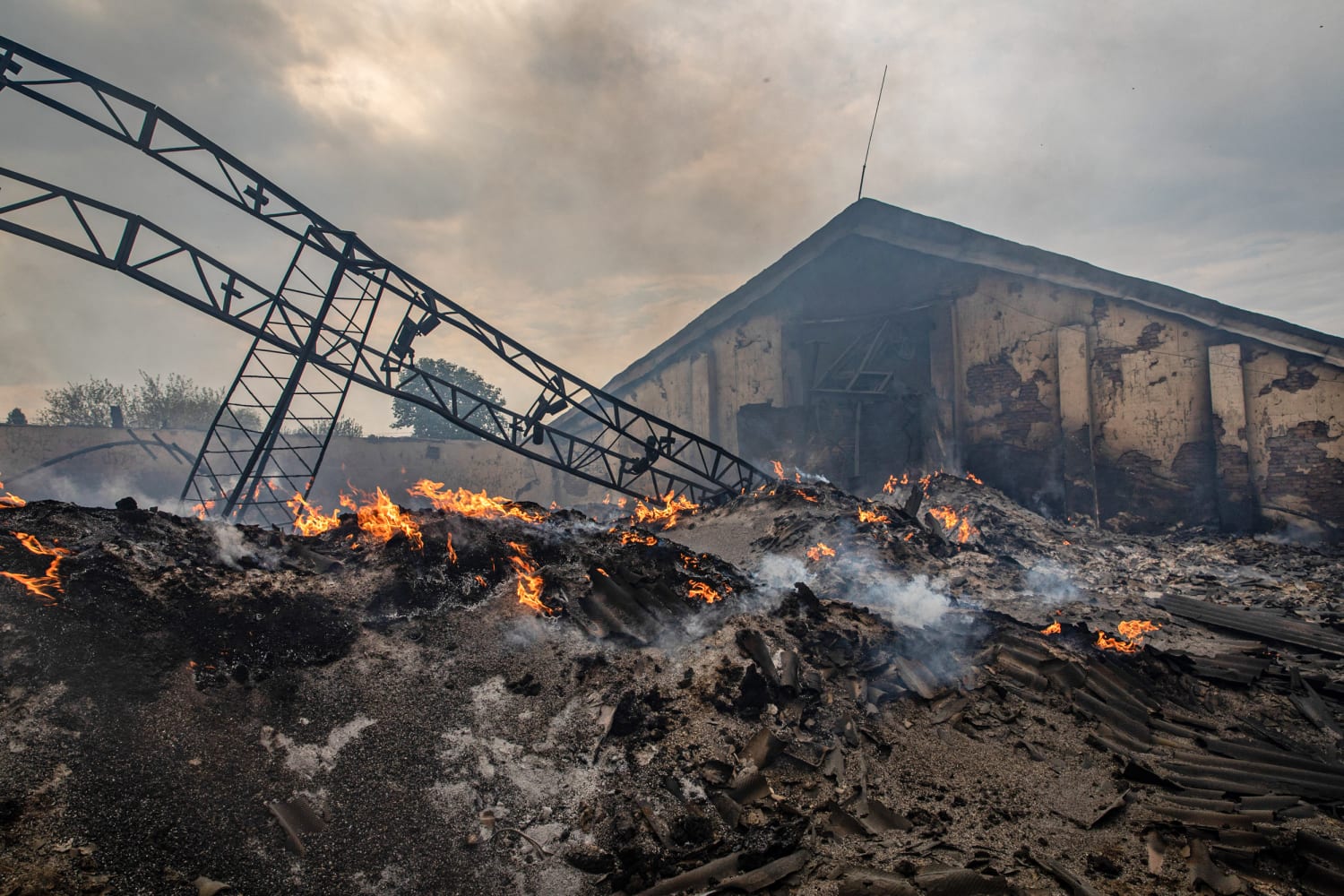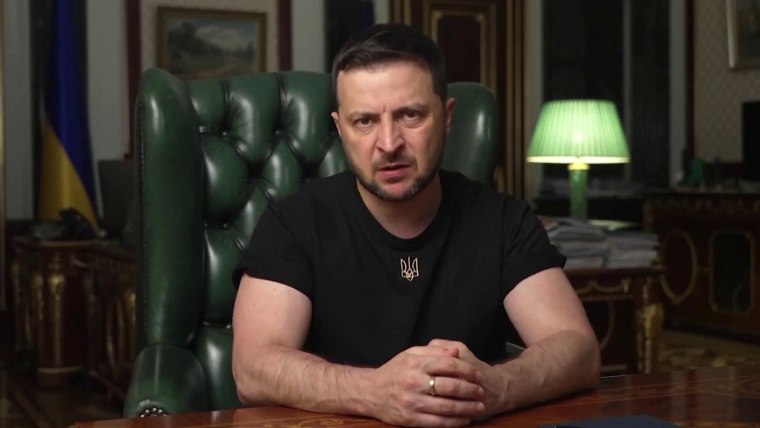A frustrated Russian President Vladimir Putin is holding Ukrainian agricultural products hostage. He’s blockading Black Sea routes, bombing silos and infrastructure and otherwise manipulating Ukraine’s consumption and sale. It’s clear that, in his desperation, he is prepared to employ a new instrument of war that could devastate civilian populations: food.
The West needs to make it quite clear at the G-7, which concludes Tuesday, and during the NATO summit later in the week that Russia cannot use food as a weapon. Already, the battle lines are forming — especially in the parts of the world most desperate for the bounty of grain found in Ukraine, one of the world’s greatest breadbaskets.
The other prong of Russia’s weaponization of food is more malicious and complex — dribbling out precious grain supplies to willing, even eager, nations whose people may be on the brink of starvation.
For centuries, Ukraine has used ports on the Black Sea to transfer vast amounts of agricultural products to international markets, especially in Africa. Before the war, Ukraine accounted for 10% of the world’s wheat exports, 14% of its corn and half its sunflower oil.
Now Russia is attempting to remove a major source of Ukrainian trade and raise the cost of grain while stepping in to provide purloined supplies to parts of the world now desperate for wheat from any source they can get it.
For starters, Russia has blockaded Ukraine’s Black Sea ports, by either seizing them outright or mining them. At the same time, it has attacked vast stockpiles of Ukrainian grain sitting in those blockaded ports or elsewhere in packed silos and warehouses, awaiting shipment to parts of the world in dire need of these crops.
Already, in the Black Sea port of Mykolaiv, two large grain terminals— one owned by Missouri-based Bunge Ltd., the other by Canada’s Viterra — were hit by Russia, whose missile strikes also targeted a bridge Ukrainian farmers use to reach a key Romanian port.
The other prong of Russia’s weaponization of food is more malicious and complex — dribbling out precious grain supplies to willing, even eager nations, whose people may be on the brink of starvation. As many as 10 Russian-flagged bulk carriers have allegedly been pressed into service transporting stolen Ukrainian grain to ports including Syria and Turkey, according to an intelligence report from London-based Lloyd’s List using vessel-tracking data. This could total as much as 400,000 tons of grain.
One of them, the Matros Pozynich, is among three ships singled out by the State Department as being involved in this illegal trade. During one recent voyage, the ship turned off its transponder, making its track impossible to follow. The carrier, believed to be filled with stolen Ukrainian grain, was then spotted by Maxar satellite imagery arriving and being offloaded in Syria.
There have been allegations that Turkey, a NATO member, is trafficking in Ukrainian agricultural products, though Turkish officials have said they have found no evidence to back up this claim. Still, the Matros Pozynich certainly docked in Turkey. The Ukraine-based SeaKrime Project said other probes show that Russian ships carrying Ukrainian grain have unloaded in Turkey and attempted delivery to the Egyptian port of Alexandria. Unlike Turkey, Egypt refused entry, and the ship wound up in Syria.
“Russia is shamelessly stealing Ukrainian grains and getting it out from the invaded Crimea,” claimed Kyiv’s ambassador to Ankara, Vasyl Bodnar. He wants Interpol to investigate.
Still, any number of other countries are said to be willing to take grain supplied by Russia from any sources to feed their people. Reuters reported last week that Bangladesh is seeking to buy at least 200,000 tons from Russian sources. Earlier in the month, Senegalese President Macky Sall, chairman of the African Union, met with Putin at his vacation retreat in Sochi, in pursuit of grain shipments to Africa. Sall referred to the “strong, fraternal relations” between Russia and Africa.
“We, the most feeble, what do we do?” Sall asked after the visit. “We are not truly in the debate about who is wrong, who is right. We want simply to have access to grain.” Indeed, pre-war, nearly half of all African countries were dependent on wheat imports from Russia and Ukraine. Last month, the U.S. alerted 14 countries, most of them in Africa, that Russia would be seeking customers for wheat it had plundered in Ukraine.
Fortunately, the U.S. is doing more than warning countries against getting food from Russia. Rep. Greg Meeks, D-N.Y., chair of the Foreign Affairs Committee, has introduced a bill to punish African countries that buy grain seized from Ukraine or side in any fashion with Russia. It passed the House 419-9 and is awaiting Senate action.
For years, of course, Russia (as well as China) has been carefully cultivating Africa — doing business and building wealth both financially and diplomatically, while the U.S. has shunned much of the continent. That dynamic accelerated under former President Donald Trump, who relegated these nations to the single phrase “s—hole countries.” That continues to smart.
Europe, too, has ceded much of the continent to Russian designs. French President Emmanuel Macron announced in February that his country would pull its forces out of a large stretch of the Sahel, where it long maintained order in the face of accelerating jihadist activities as coups and other government action made their position increasingly untenable. They were replaced by the Kremlin’s personal mercenary force, the Wagner Group. With much of the continent now threatened with starvation, Russia offers grain.
The West cannot allow Africa to take food from Russia. Though the G-7 chairman, German Chancellor Olaf Scholz, invited Sall, as chair of the African Union, to be present as a witness in discussion of food security at the G-7 meetings, much more is needed. Indeed, Sall’s leanings toward Putin suggest that diplomacy will not be enough.
The West must heed Ukrainian President Volodymyr Zelenskyy’s call, delivered as part of a video address to the G-7, for help in breaking the Russian stranglehold on grain shipments from his country. Already, Britain and the European Union have shut Russia out of the Lloyd’s of London insurance market for ships carrying sanctioned Russian crude oil. Expanding that to ships carrying agricultural products should be next.
On the other side of the equation, shunning Russia’s seductive proposals when your people are looking at mass starvation is an excruciating decision. The G-7 and NATO must make the world understand they have no real choice. Given Russia’s pariah status, among other dynamics, siding with Russia is not a long-term recipe for growth and development in their countries.
Russia has long been seen as an appropriate counterbalance to Western indifference toward Africa. But the West must engage with the continent to remind it that a central cause of the food shortages it is suffering is Russia’s very actions. Africa and its leaders need to understand that their long-term interests do not lie with pandering to Russia’s militant aims but with opposing them.
Source: | This article originally belongs to Nbcnews.com











